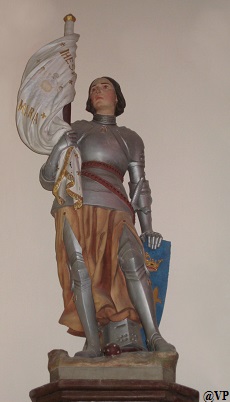Saint Jeanne d'Arc
by VP
Posted on Thursday May 30, 2024 at 12:00AM in Prayers

Sainte Jeanne d'Arc, Brittany
Prayer to St. Joan of Arc
Lord, You wondrously raised up St. Joan,
the Virgin, to defend the Faith and her country. Through her
intercession grant that the Church may overcome the snares of her
enemies and enjoy unbroken peace. Amen.
"What a spectacle," says Father Ayroles "to see this unlettered girl of nineteen years, weakened by the torments of her prison, defending herself unaided against an army of men, who were reputed to be depositories of human and divine knowledge, banded together to drag from her some incriminating word!"
What a shocking scandal for the gentle, pious peasant maiden from fair Domremy! It was an evil time; a time of schismatics and anti-popes, when king and nobles intrude into highest ecclesiastical positions their illegitimate sons or unworthy favorites. Relaxation of discipline was notorious, and all the excesses of the next century, the sixteenth, naturally followed."
Some of the Sanhedrin:
With Bishop Cauchon we are already acquainted. He had no more right to judge Joan than had the Khan of Tartary. He appointed himself; and whatever authority was lacking was conferred, in intent at least, by the university of Paris and the king of England. Neither had he any ecclesiastical jurisdiction. That Joan was taken prisoner at Compiegne was no more a reason for Cauchon to judge her anywhere, and least of all out of his diocese, than which the University of Paris had for the judging the Pope. "Fecit, tamen", as St. Augustine says of Pontius Pilate: "They did it, nevertheless."
Thomas Courcelles was especially chosen by Cauchon. He was one of the six doctors sent by the University of Paris to examine the Maid. All through the trial he was very exact in his task, and very well paid in the sum of one hundred and thirteen livres. Courcelles was one of the few in favor of subjecting Joan to torture. M. Quicherat calls him, and truly enough, "the father of Gallican liberties"; for probably no one dictated more articles than he in the schismatical council of Basle. He was the foe of Pope Eugene IV, and supporter of the anti-pope Felix V.
Erar, another of the doctors, preached at Joan in the cemetery at Rouen a discourse of extreme and unworthy violence. He was one of those who brutally tried to force Joan to sign a lying retraction. He had been rector of the University of Paris; and, like his brethren, was as anti-papal as he was anti-French.
Nicolas Midi, another of the Paris envoys, the last to preach at Joan before her execution, is supposed to have been the author - and calumniator - of the famous, or infamous XII Articles, sent from Rouen to Paris as a summary of the trial, and in which the defense is mutilated, or omitted.
Estivet, the prosecutor, canon of Beauvais, whence he was driven with Cauchon, was, of all this group, the lowest. His language resembled that of the English soldiers to Joan at Orleans.
The clergy of Rouen had been won over by the Duke of Bedfort, who showed them many favors. On October 23rd, 1430, when the price of the Maid was being handed over, he was admitted into the body of canons of the Cathedral of Rouen. The religious orders, especially the Benedictines were very numerous. We find them, unfortunately, cutting an evil figure in the trial of Joan. Gilles Duremort, abbot of Fecamp, and member of the English royal council, received the sum of one thousand livres for his share in the iniquitous transaction. He was an intimate friend of Bishop Cauchon, and was afterwards made bishop of Coutances. He did not reside in his monastery but in his fine palace at Rouen; as did his fellow-religious like character, Nicolad Lerous, abbot of Jumieges, and Pierre Miget, prior of Longueville.
Several Englishmen took part in the Process especially at decisive points. Of these was William Hayton, a bachelor in theology, secretary of the king and member of the royal council, who voted for Joan's death.
"In the name of the Lord, amen." Cauchon declares her a heretic, and cuts her off from the Church as a rotten member, and hands her over to the civil power.
(...) Joan denied that she was a heretic or schismatic; and she maintained the truth or her revelations to the last. Bishop de Mailly withdrew, in order not to see her die.
The executioner told of the cruel binding to the stake on the plaster platform, which was so high that the flames hardly reached it; and this moved the rough man to much pity for Joan. She knelt, and with tears begged pardon of all, and uttered her forgiveness for those who were guilty of her death. She prayed much - for half an hour, it is said - with indescribable devotion. Of the priests she begged Masses for the repose of her soul. (...) Then as the fire rose up, she bade the priest to go down from the platform, and begged him to hold up the crucifix straight before her eyes until she died.
(...) The English were growing harshly impatient for Joan's death and their own dinner. As Massieu was consoling her in her last agony, some of their captains cried out, "Priest, do you mean to have us dine here?" Some of them laughed at the death scene; but many of them also wept. As the flames ascended, Joan never ceased to call aloud to "her Lord" and her Saints. At last, as she bowed her head, and yielded up her pure souls to God, the sacred name of Jesus, uttered in a loud voice, was the last word on her lips.
Source: St. Joan of Arc: The Life-story of the Maid of Orleans By Rev. Fr. Denis Lynch, S.J. 1919